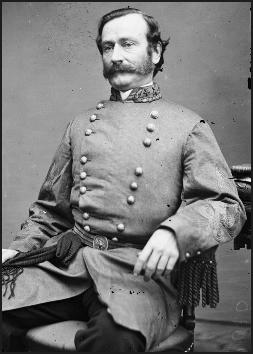 |
| General Mansfield Lovell |
NORFOLK, October 12, 1861.
His Excellency JEFFERSON DAVIS,
President of the Confederate States, Richmond, Va.:
DEAR SIR: Learning by telegraph that my family had reached Norfolk under a flag of truce, I took this place on my way South for the purpose of having them with me. I learn from Mrs. Lovell that the opinion of those in New York who ought to know was that a large expedition would shortly sail from new York and Boston for Savannah, or a point on the coast in that vicinity. Mr. James Gallatin, of New York, an eminent financier and prominent Republican, stated as above in presence of Mrs. Lovell, and the several railroads draining a cotton-growing country, which converge at Savannah, give probability to the report. He also said that ten of the small steamers about completed were to be sent to the mouth of the Mississippi. Mr. Gallatin, although a Republican, is opposed to Lincoln and his cabinet, declaring that their removal must be preliminary to any attempt at peace. An iron-plated steamer has been finished and has made a successful trail trip; another is in progress, and the expense proving less than was anticipated, a third has been ordered. Recruiting is at a stand-still, and Mr. Gallatin said that next week they would be obliged to commence drafting in New York to keep the army full. They are daily expecting an attack in Washington by our troops. That city, however, is represented to be very thoroughly fortified and the troops in a good state of discipline. No point has been left undefended. When our advance was thrown forward to Munson’s Hill, McClellan had made all his arrangements to envelop and destroy them, when they fell back and thwarted his plans. He had communicated his intentions to Mr. Cameron, who mentioned them to others, and McClellan thought the withdrawl was in consequence of knowledge thus obtained, grew indignant, and sent in his resignation, declaring that he would have nothing further to do with the army unless he had complete control. This was last week. General Scott is rapidly failing, and in a semi-comatose state. There is evidently quarreling and disagreement between the generals and the cabinet. The general tenor of the information I get is as favorable to us as we could hope. They regard themselves as on the defensive, and McClellan will make no attack, except in the shape of a coup de main, and will not leave his base far to do that. Business is said to be improving in New York. I communicate these points hoping that, taken in connection with other information, they may assist you in deducing your conclusions.
Respectfully, your obedient servant.
M. LOVELL
[Indorsement]
SECRETARY OF WAR:
The defenses of the Southern coast have received attention. Anything which suggests itself we can discuss.
J. D.
Official Records, Series I., Vol. 51, Part 2, Page 344.
The M. Lovell who sent Davis this interesting letter was Mansfield Lovell. Along with General G.W. Smith, he served as a street commissioner in New York City until an opportune time came to head South for a commission in the Confederate Army. Here he relates several items of intelligence gathered mainly by his wife in social circles in New York City. The effort to take Savannah mentioned was an accurate report of the upcoming Port Royal expedition. The iron-plated steamer mentioned was probably the Monitor, but it was just under contract and far from ready for trials. Recruitment had slowed, and was always problematic in New York City, but the draft would not commence until August of 1862. The report of the state of defenses around Washington was accurate, although the supposition of a trap set by McClellan against an advance to Munson’s Hill is questionable, although something he might have said in hindsight. Lowell was most accurate in his assessment McClellan would not move to the attack any time soon. His characterization of Scott’s health overstated the dire state of his condition, but it is true he was in failing health. Overall, a fairly accurate bit of information. Davis’ endorsement to Benjamin focused on the threat to the coast. Lovell would command, and lose, New Orleans for which he was subject to a court of inquiry. He was removed from field command, but served as a staff officer to Johnston.
No comments:
Post a Comment